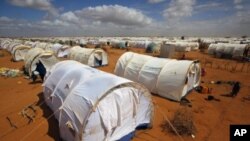A medical aid group says conditions are worsening at the world's largest refugee camps in Kenya.
Doctors Without Borders says humanitarian agencies are struggling to provide meaningful aid on an ongoing basis to the more than 400,000 refugees at the sprawling Dadaab refugee camps.
The group says all "non-lifesaving activities" at Dadaab were suspended in October, after the kidnapping of its two aid workers, and a worsening security situation. It says that many of those services have still not been restored.
The group says the international community is failing to provide the camps' residents with more than the bare minimum, and that many of the refugees live in "inhuman conditions."
Most of the refugees at Dadaab are Somalis who fled last year's severe drought or Somalia's chronic conflict.
Doctors Without Borders said the health of refugees at the complex is deteriorating, with recent outbreaks of measles, cholera and acute diarrhea. It estimates one in 12 children in the camp is malnourished.
The group said while the international media has focused on the improving drought conditions in the region, it has largely ignored the plight of Dadaab refugees, who it says have "little hope of improvement in the short-term."
Though MSF says it halted its activities in the portion of the camp where the kidnappings took place, it continues to run a hospital and four health posts at the nearby Dagahaley camp.
It called on the Kenyan government, international aid groups, and the U.N. Refugee Agency (UNHCR) to provide "continuous support" to the Dadaab camp, saying thousands of refugees are relying on their support.
Aid Group: 'Inhuman' Conditions at Kenyan Refugee Camps




